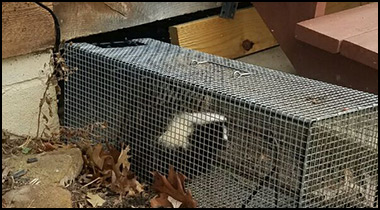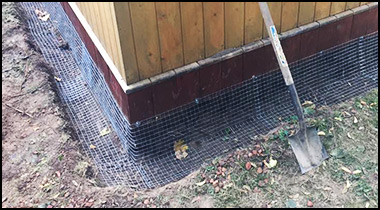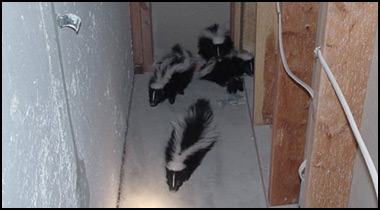Charleston Skunk Removal Resources
Skunk Rehabber - OMAWC Exotics & Wildlife rehab: 304-822-4489
Free Kanawha County Animal Services: 304-342-1576
Humane Wildlife Trappers of Charleston: 304-306-7050
If you need skunk control in Charleston, you have a few options. First, you can attempt to solve the skunk problem yourself by reading our do-it-yourself guide. If you need outside help, you can also call Kanawha County Animal Services to see if they have any free resources or help for you - however, they primarily deal with dog and cat concerns. You can also call a local Charleston wildlife rehabber, as they are typically a great resource for advice that is in the best welfare of the animal. If as a last resort you must hire a professional company, we recommend Humane Wildlife Trappers of Charleston at 304-306-7050. To learn more about them or check their skunk removal prices, visit charlestonwvpestanimal.com.

Charleston Skunk Trapping and Removal

Preventative Repairs & Exclusion

Charleston Skunk Removal From Structures
In many cases, preventative measures can solve your Charleston skunk problem - keep garbage secured, pet food indoors, and most of all when it comes to skunks, secure the perimeter of your shed, porch, deck, or house with a barrier - lattice or steel mesh is good, and it keeps West Virginia skunks from going under the structure. If trapping and removal of the skunk is the only option you have, please do so with the help of a local agency or professional company who knows how to do it humanely and legally. Browse the resources of this site for more educational information.
Frequently Asked Questions:
Prevention: How to Keep Skunks Away
What to do with a skunk after I catch it?
Is it legal for me to trap a skunk?
How to remove skunk odor
Is a skunk active during the daytime rabid?
What does skunk feces look like?
Charleston Skunk Control Information: Do Skunks dig in Lawns Looking for Food?
Skunks front paws have a very prominent look to them. What stand out are the very long and very sharp claws. These claws can be of help or hindrance to the skunk. In terms of searching for food they are the skunks best tools.
The skunk's claws are specifically designed for digging. On their nightly forages the carnivorous skunk will set about looking for food such as eggs and insects particularly grubs. The claws allow during the digging to move roots or anything that may stand in the way of them and food.
Generally vegetable gardens attract a variety of insects that feeds on various vegetables. This will make the skunk more anxious about digging up your yard or garden to get the insects.
Skunks are attracted to several other inhabitants of the earth. If they should sense that what they want is under the lawn they will go after it. In general however, the skunk will dig up the lawn just to see if there is anything to be found.
The mere fact that the skunk is a forager is a clear indication that digging up anything is part of their pattern.
You may also find that the skunk may dig up your lawn in an attempt at obtaining shelter. Should you have a hole at the side of your porch the skunk will dig through the grass to extrude the hole for entry.
Using fencing to keep skunks from entering your property will also encourage the skunk to dig underneath the fence and up through your lawn for food purposes.
Skunks are indeed diggers and they can do very little else with their claws but dig. They may dig at leaves and brush for shelter or clear out an abandoned den also for shelter. During winter months they may dig out the snow to leave their den and forage. However, these are about the only reasons a skunk will dig. Protection may also apply the use of the claws but they generally count on the spray for that.
If a skunk is looking for food particularly insects there isn't a place that is considered sacred ground when it comes to digging. This includes the lawn. Prevention of digging could include both motion detector lights and motion water sprinklers. Both will send a skunk scampering. Using such precautions will help you and your lawn.
Remember, for free services you can try 304-822-4489 or 304-342-1576, but if you need to pay for professional help, check the prices at the charlestonwvpestanimal.com website. Or follow our do-it-yourself guide!

